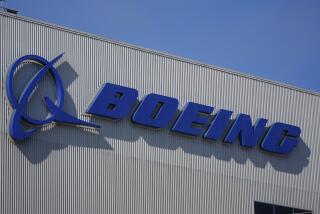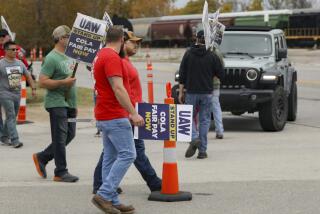UAL’s Shares Decline With Hopes for Buyout : Airlines: United Airlines’ pilots, managers and flight attendants face big obstacles in packaging a new offer for UAL Corp.
- Share via
UAL Corp. shares dropped more than $21 Friday, one day after British Airways said it would not support a revised bid for the parent of United Airlines.
UAL closed at $168.50 in trading on the New York Stock Exchange as Wall Street grew pessimistic about a potential buyout. The airline’s stock price has fallen $116.50 a share since financing of the $6.75-billion plan for an employee-management buyout collapsed a week ago.
“It’s a depressing situation,” said one trader whose firm invested in UAL shares. “It can make you feel like crying.”
Representatives of United’s pilots, flight attendants and top managers met with their advisers in New York on Friday in an effort to restructure the deal. The group, led by United Chief Executive Stephen M. Wolf, needs to find a partner with deep pockets to replace British Air. The British carrier had agreed to contribute $750 million to help buy the airline but withdrew its offer after banks declared the deal too risky and refused to lend money to finance it.
The Wolf group was expected to meet with the advisers through the weekend. In a statement, the pilots union said it would present UAL’s board with a proposal at “the earliest possible time.” People familiar with the situation said it was doubtful that the Wolf group would have a solid new offer ready by the time UAL’s board meets on Monday, although it was possible that a preliminary plan would be delivered.
It was not clear what action the board would take. It could continue to study its options or it could say that the company is no longer for sale. Some sources in the financial community said the board, embarrassed by the failed takeover, might feel pressure to fire Wolf or UAL’s chief financial officer, John C. Pope, who led the buyout group’s unsuccessful effort to finance the transaction.
None of UAL’s directors could be reached for comment Friday.
Traders, stock analysts and bankers who followed developments surrounding the transaction said it might be difficult for the Wolf group to find a new partner quickly. Two employee groups, the machinists union and an organization that represents United’s non-union workers, have opposed a buyout and called for Wolf’s resignation. The division among United’s workers might make a potential partner hesitate about financing a Wolf-led buyout, informed observers said.
Moreover, any partner willing to finance a takeover would probably want control of the airline, a condition not likely to go over well with United’s pilots and managers, who would have owned 85% of the airline under the failed proposal.
For that reason, it was considered unlikely that Los Angeles billionaire Marvin Davis would help the Wolf group finance an employee buyout. Davis, who in August set in motion the events that led to the buyout proposal with a $240-a-share bid, has said that he might give employees a stake in UAL but that he wants control. He said this week that he is still interested in the airline.
Sources said Davis was exploring whether financing would be available for a UAL transaction in the wake of the failed bid. Davis and the Wolf group use the same lead bank, Citicorp.
Besides dealing with tricky financing problems, Davis would have to bring together United’s fractured labor unions. The machinists, United’s largest labor group, have tried to derail a buyout and cheered British Air’s withdrawal. “I’m surprised it took them this long to see the folly of their ways,” said Brian Freeman, an adviser to the machinists.
Freeman said the machinists would continue to oppose a debt-financed employee buyout, a position that could hurt the Wolf group’s chances.
Japanese bankers especially have been leery about backing a buyout not endorsed by all United’s unions, and that attitude isn’t likely to change.
More to Read
Inside the business of entertainment
The Wide Shot brings you news, analysis and insights on everything from streaming wars to production — and what it all means for the future.
You may occasionally receive promotional content from the Los Angeles Times.










